Babcock International sees Rosyth as central to the future naval programmes, with both space for expansion and the ability to support export work on the Type 31 frigate and potential Multi-Role Support Ships (MRSS).
John Howie, Babcock’s Chief Corporate Affairs Officer, said the company has already secured planning consent for the next stage of Rosyth’s development.
“One thing Rosyth is really lucky with is space,” he noted. “If we really needed to, we’d fill in the hole at the end of the yard, put concrete down and put sheds there as well. Space isn’t really our issue.”
The bigger challenge, he said, was finding and training the workforce. “Can you get the right numbers of people? Shipbuilding traditionally used transient contract labour from Western Europe, that’s much harder today. However, on the plus side, we’re running the biggest ever apprentice programme we’ve had, investing in graduate programmes and reskilling. One of the most successful things has been the production support operative programme, which we’ll now roll out across the country.”
Howie argued that MRSS lends itself to the same collaborative model used on the carrier programme. “You need an assembly yard who can manage the customer and deal with the complex security issues, but you also need a network of yards that can contribute volume to get time and cost down.” Rosyth, he said, has the space and infrastructure to act as that lead assembly yard, with scope to bring in other yards for block build and support.
I asked Howie about the export dimension: with interest in Type 31 coming from 17 countries, how many of those might expect work to be done in the UK? He replied: “To put a percentage on it, I can’t remember all the 17. I would say there is a mix. There’s at least a good handful of countries that would expect to build in the UK. There’s probably another handful that might expect the UK to do block build — you’ll build blocks, ship it out, or do the flat packing of the other structures and send out. And then there’s those countries that clearly want to build it themselves, like Poland. But actually, I’m quite pleased how many people look at UK build. My origins are in shipbuilding, and everybody used to want to build it themselves, because it was seen as nation building. There has been a bit of a change.”
He also linked Rosyth’s capacity to Babcock’s export ambitions. Despite the challenges of designing a frigate through the pandemic, Brexit and inflation, the programme has already secured international orders. “Before we’d even built the ship, we’d sold it to Poland and Indonesia. We’re now talking to Sweden, Denmark, New Zealand, Chile and around 17 countries in total. Contract award to the delivery of five ships in a decade — we can’t find another yard anywhere in the world doing that.”
The size and modularity of Type 31, he said, also help Rosyth’s case. “It was designed to be easy to manufacture and highly modular, which makes it better for automation and robotics. That also means when we export it, countries that want to build at home can, but others are still looking at UK build or block build.”
Howie concluded that while other UK yards have a role to play, Rosyth’s scale and investment position it at the heart of both domestic programmes and exports. “Space isn’t our issue. The issue is skills, and we’re tackling that with apprenticeships, re-skilling and new entry routes. That puts us in a strong place for MRSS and beyond.”


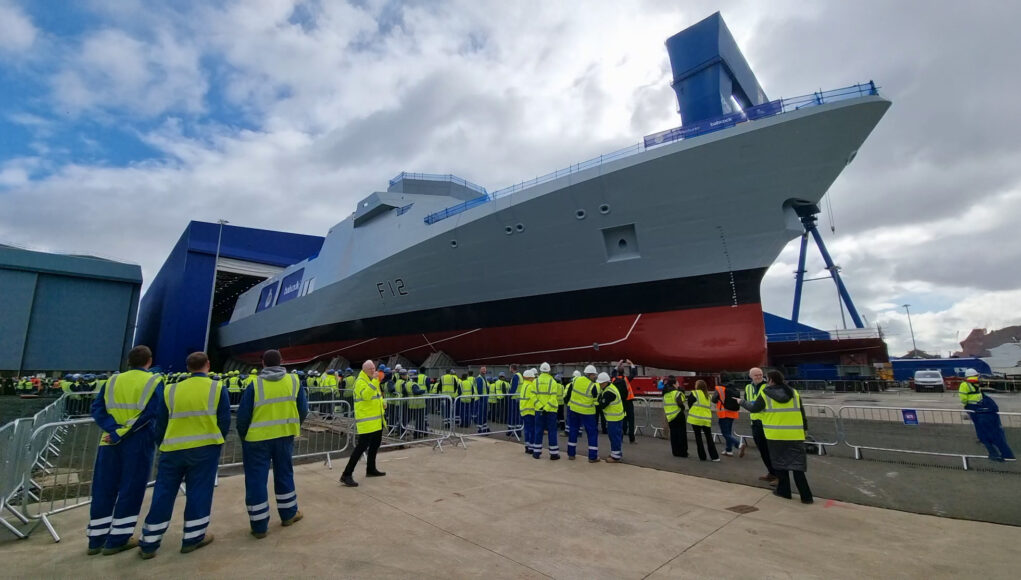
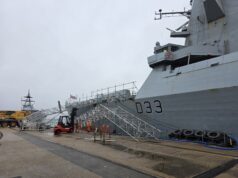
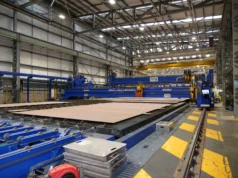
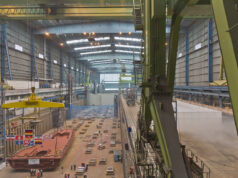


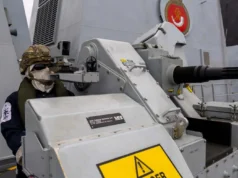


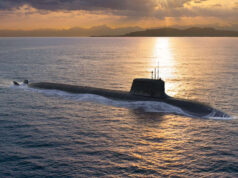


It would be brilliant to have Babock expand Rosyth into some kind of ”super yard” for additional Type 31 and MRSS. But they have to be very sure the yard will be kept well stocked with domestic and export work for the long term, otherwise what is the point. The government needs to be absolutly clear they will subscribe to continues shipbuilding even if the economic conditions are dodgy for this to work, which of course is fantacy at the moment.
I suspect the reason the yard “has so much space” is simply that after WW2 there has been a near complete destruction of shipbuilding in the UK.
Rosyth freeport was suppost to be that but nothing has happened yet
It would be good to see these manufacturing yards to have the additional capacity to do servicing and mid life refits of the vessels they build. They know them intimately as builders and allows the RN to focus more on ops at sea. Outsource the servicing to the builders.
I know a skilled welder, we talked about Babcock and the opportunities. His reply? “Trouble is no way will I move to Scotland”. And he was serious.
I had a similar conversation with a good friend of mine. An obstacle, but could it be overcome?
Doubt it TBH. When he took into account location, schools and healthcare standards? As he said there is family to consider, plus the politics put him off so he is staying in Cumbria.
It needs longterm political commitment.
If they get foriegn workers in just make sure they don’t start sabotaging things we all know what people I mean. .
No we don’t… What DO you mean?
People that might think our weapons could be used against their brothers chum that’s what I mean. It would not be the first time….
Another batch of 5 T31s along with a Danish and Swedish order would secure the yard towards the backend of the 2030s.
They may actually be able to hit 31 type 31s by 31 if they have 17 nations interested, even if only say a third actually buy. I’d love to see a list of all the interested nations and what order sizes they’d be looking at.
Can someone explain how the ships get there type number
Its all down to the evolution of the old escort classification system that came about in the 1950s. At that point, the navy had so many different single-role ships planned that it needed an easy way of identifying what each one did, especially because the first designs featured common hulls across several types.
Thus, you had Type 1X ships as anti-submarine frigates, 4X as anti-aircraft frigates (originally not including contemporary destroyers like the County-class), 6X were aircraft direction frigates (a funny way of saying “small ship with big radar for radar pickets), and 8X were your general-purpose or multirole ships. That last one was a little bit of a mixed bag, as the only two classes to bear the 8X type were a patrol sloop/frigate with limited armament, and the cruiser-sized HMS Bristol and her intended class of well-armed destroyers.
Since then, the system has expanded. 2X numbers were included for ASW after 1X ran out, 3X is now the type for general-purpose frigates, with 8X now exclusively referring to multirole destroyers like Bristol and the upcoming Type 83. 4X remains anti-aircraft, but the ships became larger and are now classified as air defence destroyers. 6X hasn’t been used since its first outing, whereas we’ve recently gained the type 9X series for unmanned vessels.
Frankly, as a system it no longer serves a purpose. At its height, it helped manage a fleet juggling more than a dozen sloop, frigate, and destroyer classes, but we’re currently down to 14 escorts across 2 classes. Every ship is now multirole to a greater or less degree, and as a trend that is likely to continue. A new system, preferably avoiding any crossover with the PLAN, is needed; perhaps a return to the rating system as an assessment of capability for surface ships (e.g. T31 become Second Rates), while unmanned systems get a letter ID tied to their own pennant number (e.g. the T92 USV could revive the old sloop pennant of U to become the U1 class, while the unmanned submarine T93 project would become something like the T1)
With Poland potentially picking up contract work from the potential Scandic orders, why are we not pitching warships to Ukraine (after the war ends) working with… Turkey? They are after real world experience to improve their warship design and build and we have a strong relationship with Ukraine – would it make sense and position UK designed warships in the back yards of France, Italy and Spain – there must be a lot of potential orders bubbling away at the moment, and with Indonesia sharing tech surely, there is a way to UK designed warships operating in all the oceans of the world.
Just an idea, but, Rachel from accounts would be happy with the tax income she would receive.